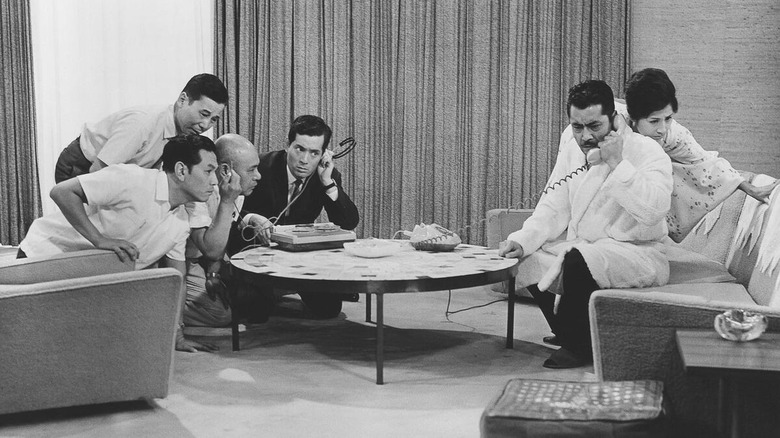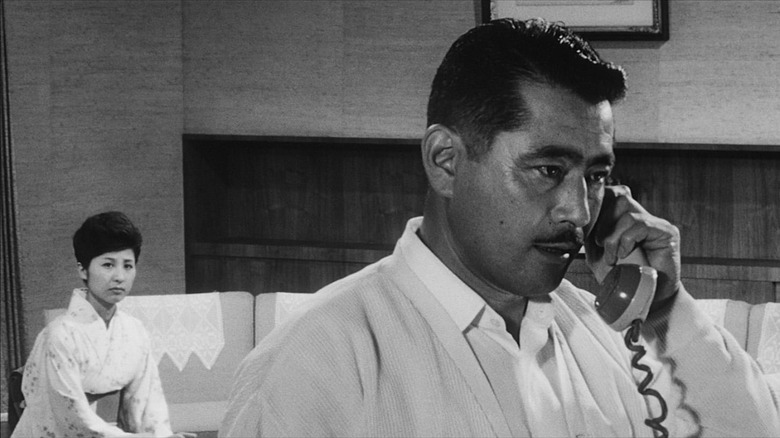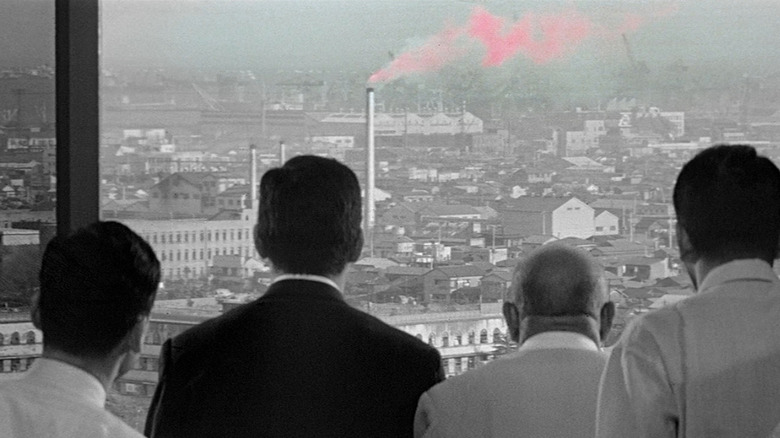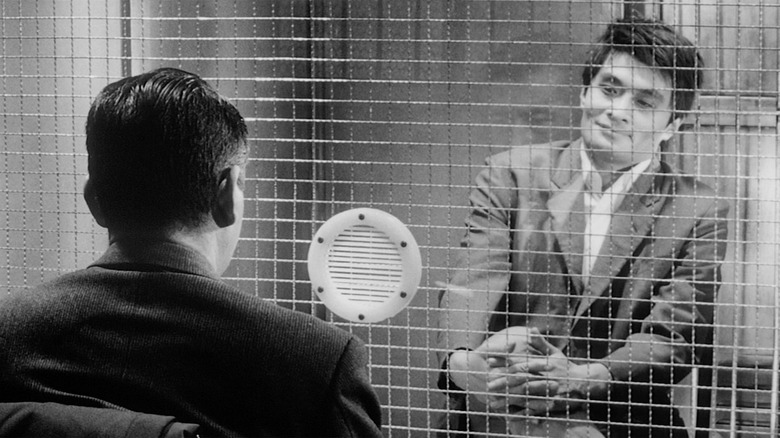High And Low Ending Explained: Heaven And Hell In Japan
Unlike many of his Japanese filmmaking peers such as Yasujirō Ozu and Masaki Kobayashi, Akira Kurosawa often adapted Western literature in his films. That said, he was always sure to give them a Japanese reframing. He remade "Macbeth," "Hamlet," and "King Lear" as "Throne of Blood," "The Bad Sleep Well," and "Ran," respectively. However, "Throne" and "Ran" traded medieval Scotland/England for Feudal Japan while "The Bad Sleep Well" was about the 20th-century Japanese corporate world, not the Danish monarchy.
While Kurosawa was a student of Shakespeare, he didn't only trade in high-end literature. For "High and Low," he adapted the pulp detective novel "King's Ransom," moving the setting from Manhattan to Yokohama.
National Shoes executive Kingo Gondo (Toshiro Mifune) is disgusted by his colleagues' greed and apathy. He plans a leveraged buyout of the company, putting his life savings on the line. Unfortunately for Gondo, a kidnapper picks the day prior to abduct his son for a 30 million yen ransom — only to wind up taking the son of Gondo's chauffeur Aoki instead. Gondo's family is still in the line of fire, though; if he pays to save the boy's life their livelihood will be ruined.
A firecracker of a thriller, "High and Low" feels like two films in one. The first half of the film is confined to Gondo's apartment, but as we've written before, Kurosawa creates suspense with just his blocking. After Gondo relents and pays the ransom, the film switches focus to the detectives trying to identify the kidnapper and recover the money.
The high
"High and Low" is a story of class war; it's so effective because it shows all sides and the unique dynamics they share. At the center of the story is Gondo himself. Once a cobbler's apprentice, he's now an executive who has climbed the social ladder thanks to both professional success and marrying wealthy. Since he's secured wealth, he's determined to keep it; the worst fate he can imagine for himself and his family is destitution. Therein lies the corrupting influence of wealth; Gondo is basically a good man, but money is keeping him from doing the right thing. Before they learn of the kidnapping, Gondo's wife Reiko (Kyōko Kagawa) warns him, "Success isn't worth losing your humanity." She continues to be the angel on his shoulder during the ordeal, telling him to make the ransom payment. When Gondo does just that, he's hailed as a hero by the public — but not his creditors.
The film illustrates the ruthlessness of capitalism in every rich man besides Gondo. When it looks like Gondo might pay the ransom, his secretary Kawanashi (Tatsuya Mihashi) sells him out in "self-defense," informing Gondo's rivals of the buyout plan. The bankers also refuse to give Gondo relief despite the extraordinary circumstances. The detectives return the money a day too late and Gondo's possessions are all auctioned off.
The Gondo family are the only rich people in the movie whose blood hasn't totally chilled; Detectives Tokura (Tatsuya Nakadai) and Taguchi (Kenjiro Ishiyama) remark how extraordinary this is. Why are they different? Gondo wasn't born into privilege, so he can empathize with people who don't have it. While Reiko does come from money, she hasn't been forced into the cutthroat game of capitalism due to Japan's patriarchal society.
The low
"High and Low" would be misleading if it only focused on privileged characters. For one, there's Aoki, the unintentional victim of the kidnapping. He naturally begs Gondo to save Shinichi's life. When Gondo does so, he falls to his knees in relief only to be met with annoyed dismissal. The kidnapping only heightened the employer-employee relationship that the two shared; now it wasn't just his livelihood at Gondo's mercy, his child's life was too.
Another member of the lower class is the kidnapper Ginjirô Takeuchi (Tsutomu Yamazaki). Instead of sublimating himself like Aoki, he's decided to lash out. He's from the same slums as Gondo but never rose out of them. Stuck in a house, "cold in winter and so hot in summer [he] couldn't sleep," he came to hate Gondo purely from the sight of his mansion.
This is how the film's themes of class are reflected in its geography. Gondo's mansion sits on a hill and through its window deck, it looks down upon the city. The city, and its inhabitants, are literally divided between the few on high and the many left stuck in the low. It's also worth noting that "High and Low" is only an English approximation of the title. In the original Japanese, it's called "Tengoku to Jigoku," or "Heaven and Hell." Takeuchi feels "[his] whole life has been hell," so he wants to drag someone down from heaven.
Face to face
In the final scene of the film, Gondo and the sentenced Takeuchi finally meet each other face-to-face. Takeuchi tries to be flippant, explaining his envy for Gondo's comfortable life and maintaining he has no regrets. Gondo asks, "Why do you think we have to hate each other?" and Takeuchi responds, "It's amusing to make fortunate men taste the same misery as the unfortunate."
Except Gondo has tasted the misery of the unfortunate. Takeuchi's plan also caused just as much pain to working-class people; aside from Aoki and Shinichi, he killed his two co-conspirators. Takeuchi failed to accomplish anything except getting himself a death sentence, which is why his calm fails him and he breaks down.
Gondo, on the other hand, got a fresh start; his possessions were auctioned off but he got the ransom money back and he's found a new job. It's a smaller firm than National Shoes but he has more creative control, which is what he wanted all along. "High and Low" doesn't end with hierarchies upended; even when Gondo enters the jail, there are janitors kneeling on the floor, lower than him literally and socially. It's also worth noting that Gondo loses his hilltop house in the end, thereby falling from both heaven and descending back down the social strata. However, he lands on his feet, even if it's in a more modest state. Wealth isn't heaven, personal satisfaction is, and you can find that without riches.



